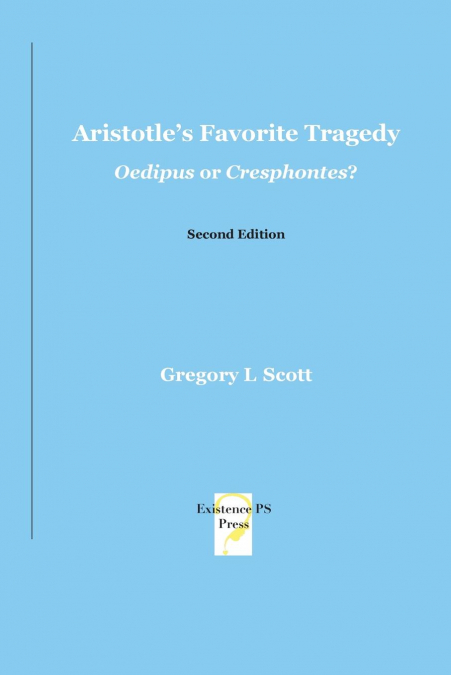
Gregory L Scott
The Poetics is considered the foundation of Western dramatic and literary theory, and readers interpret Aristotle on the basis of Chapter 13 to claim that Oedipus, with its pity, fear and horrible ending, is always the finest type of tragedy. Some specialists, however, discuss Aristotle also stating in Chapter 14 that the happily-ending plays like Cresphontes are the finest, with the type of plays like Oedipus, which involve an agent killing or committing great suffering to a family member and only recognizing the family connection afterwards, being second-best. This passage obviously creates a dilemma. No commentator has ever been able to resolve it to the satisfaction of the profession, and as a result Oedipus maintains its stature. Indeed, the specialist Elizabeth Belfiore recently published ('The Elements of Tragedy,' in A Companion to Aristotle, ed. Georgios Anagnostopoulos, 2009) a defense of Oedipus as the best play for Aristotle in spite of the explicit ranking of Chapter 14.Gregory Scott here demonstrates instead that Aristotle actually means what he says in Chapter 14: Tragōidia, originally 'goat-song' or the like, and typically translated misleadingly as 'tragedy,' really involves for him serious drama primarily about good people, and Aristotle says three times in the book that it can end in misfortune or in fortune. Scott, building on his ground-breaking work from 2003, 'Purging the Poetics' (Oxford Studies in Ancient Philosophy) that is reprinted in his Aristotle on Dramatic Musical Composition: The Real Role of Literature, Catharsis, Music and Dance in the POETICS (2nd ed., 2018), resolves the dilemma between Chapters 13 and 14 once and for all, showing that the latter half of Chapter 14 is about tragōidia in general while the earlier text is only about one or two (or a mixture) of the subclasses of tragōidia as given in Chapter 18 and rarely discussed by commentators: 'tragedy' of suffering, complex 'tragedy,' 'tragedy' of character, and simple/spectacular 'tragedy.' The chapters are arbitrary divisions from the Renaissance and the texts must have both come from different original treatises of Aristotle and been assembled badly after his death, or the texts were part of a much larger work, now lost, in which the rest of the theory and the transitions from one topic to another were delineated.In addition to resolving the perennial dilemma and shining a better light on Aristotle’s notion of 'tragedy,' Scott also explains why the best type of play like Cresphontes is better than the second-best one, when they both have recognition and reversal, the conditions for the best kind of plot for Aristotle. With all of this in place, we can easily detect another dilemma that rarely gets discussed in the ranking of the four types of 'tragedy' in Chapter 14: The third best type, which is not problematic in this context, involves an agent who knows someone is a family member and who kills the member anyway; we can easily deduce Medea is an example. However, all known commentators accept that Aristotle speaks of Sophocles’ horribly-ending Antigone when he exemplifies the worst of the four types. Yet the reason Aristotle gives for the last-place finish is that Antigone is both apathes, 'without suffering,' and miaron, 'shocking' or 'revolting.' Scott explains in detail not only that Aristotle must be speaking of Euripides’ version of Antigone, which ends happily, but why its last-place ranking results.For Updates and Errata: www.epspress.com/ArFavUpdates.html 3